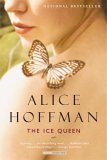Summary | Excerpt | Reviews | Readalikes | Genres & Themes | Author Bio

This is what I saw: Most of the shelves were empty. Budget cuts.
Public's lack of interest. I had more books packed in cartons and left
in storage in New Jersey than the Orlon Public Library had in its
entirety. There were no computers available to the patrons, only one
ancient word processor at the desk, and an old-fashioned card catalog
was still in use. As for the reference department, there didn't seem to
be one. After several weeks at work, there'd been only three calls of
any kind: two concerning the proper use of fertilizer, and a third from
a second-grader wanting to know what medical school Dr. Seuss had gone
to. Maybe I should have lied to my young caller, but it wasn't in my
nature to do so. When I told her that her favorite author wasn't a
doctor, that in fact his last name wasn't even Seuss, she hung up on me.
I suppose no one had told her before that she mustn't trust words, not
even the ones in books.
Because we were a college town, the students at Orlon had their own
high-tech facility, so our little building was all but invisible to
them. And as our budget didn't allow the purchase of any new editions,
even the local folks stayed away. The only weekly activity was the
nursery-school reading club, but that group was nearly disbanded after I
read "The Goose Girl," a tale in which a truth-teller, a beloved, loyal
horse named Falada, continues to speak long after his severed head is
mounted on the wall. Frances took back the position of reader, even
though she was nearly blind and had to hold a book right up to her face
to make out the story. Frances was polite about my removal, and I
understood. Death was my talent, not lively toddlers. I gratefully
relinquished the nursery group, happy enough to avoid the rush of noisy
little creatures on Thursday afternoons.
During my hours at the library I found myself longing for questions
about death. New Jersey had begun to seem like a dream rather than a
nightmare. I stared at the phone, missing Jack Lyons and his calls; our
longest, most intimate conversations had been about diseases that were
spread by mosquitoes, especially West Nile virus. As for my brother, he
and Nina were busy with their work at the university; after they'd
helped me set up the house—which my brother had failed to mention was
not air-conditioned, there was only a ceiling fan—I rarely saw Ned and
his wife. I hadn't expected more, and why should I have? They had their
own lives, after all.
In the evenings, I listened to the radio and busied myself with
killing flies, using a flyswatter I'd bought at Acres' Hardware Store. A
bit of death at home. Something I understood. Something I was good at.
I'd killed hundreds of flies in no time. I kept piles of bodies on the
windowsill. That's what I was doing when it happened. I was holding the
flyswatter when I saw something that appeared to be a tennis ball right
in front of me. The window was open, the ceiling fan was on, the sky was
heavy with heat. I thought perhaps some neighborhood kids had thrown the
ball through my window. I didn't care for children of any age or size. I
knew how they thought and what they were capable of. I was about to
shout out for the culprits to get off my lawn. But then I saw that the
ball was oddly bright, so shimmery I had to squint. When my gaze shifted
I noticed that the flyswatter I was holding was edged in fire and that
the fire was dripping down onto the floor, like a sparkler on the Fourth
of July.
From The Ice Queen, pages 3-31 of the hardcover edition. Copyright © 2005 by Alice Hoffman. Reproduced with the permission of Little, Brown & Co.
Your guide toexceptional books
BookBrowse seeks out and recommends the best in contemporary fiction and nonfiction—books that not only engage and entertain but also deepen our understanding of ourselves and the world around us.